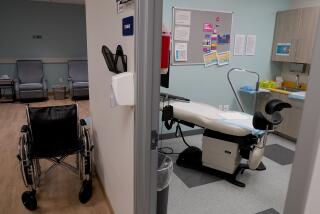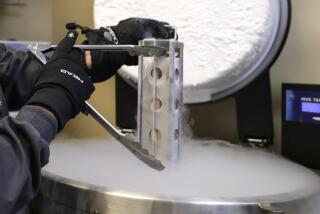Op-Ed: My father was an anonymous sperm donor. I feel the consequences of that every day
I got the truth when I was 16: My mother hadn’t gotten pregnant by an ex-boyfriend. I was, rather, the product of a completely intentional transaction. My father was an anonymous sperm donor.
My mom conceived me on her own at a time when it wasn’t in vogue to do so, and she didn’t tell her siblings or parents what she’d done. The revelation hit me deeply. An introverted, introspective teen, I internalized her decision to hide the truth as my own shame — shame I still feel today.
In adoption law, the child’s well-being is a primary consideration throughout the adoption process. But the children who result from anonymous sperm donation aren’t even a legal afterthought. From the point of donation to the point of birth and beyond, the rights of parents and donors trump those of the children they created. There certainly are no home visits or background checks (although my mom was required to consult a psychologist back in 1989). All that’s required to buy sperm or eggs is an ability to pay.
The ‘products’ this industry creates are humans, and the laws that govern it should reflect that.
That lack of consideration is something I feel the consequences of every time I’m asked where my parents live, every time a doctor wants my family medical history, every time I’m confronted with being biracial (my mom is black but there were no black sperm donors at her cryobank in ’89) and every time I wonder what attributes of mine come from this anonymous man.
I’ve tried three times to answer such questions, first when I was 19. My return call from the California Cryobank came while I was working at a summer camp, surrounded by young kids. I withdrew to the bathroom for some privacy. I still remember staring at the blue door of the stall as I listened to the woman who was the gatekeeper to my father tell me she remembered him from the late ’80s, that he was “very nice,” but that because he has a family and never told his wife about donating sperm, he wanted to stay anonymous.
I tried again three years later. I was proud of myself for graduating from an Ivy League college, as were the people who loved me. I hoped this might pique my father’s interest. This time I asked the sperm bank for a picture of him at any age, and to have my email address forwarded to him. No luck. Two years ago I emailed again requesting all available medical history. I received in return a digitized copy of the form that he filled out to become a sperm donor in 1987, and a firmly worded message stating that this was the only information available to me. I had reached the boundary where my rights ended.
I have a good relationship with my mom and I understand why her desire for a child led her to pursue parenthood using a stranger’s sperm. I acknowledge that I wouldn’t exist otherwise. Still, I wish I’d grown up with that truth, and that my mom and parents like her were counseled about the psychological implications of that decision for their children.
Early last year, the Donor Sibling Registry, which is an online support group turned family-finder for donor offspring, submitted a Food and Drug Administration citizen petition asking for greater regulation of the donor industry. The petition is worth reading; in addition to outlining the issues that donor offspring confront, it raises a number of questions about how ethically cryobanks are operating in the absence of regulation. The petition’s suggestions include expanding and standardizing medical and genetic testing of donors, providing mandatory updates, record keeping on the number of births and a ban on anonymous donors.
Britain made anonymous sperm and egg donation illegal in 2005. When asked about the decision at the time, Health Minister Stephen Ladyman said, “We think it is right that donor conceived people should be able to have information should they want it about their genetic origins.” Likewise, in Sweden, Norway, Germany, Italy, New Zealand and Australia, clinics must be licensed by the government and donors cannot be anonymous.
In our age of online DNA testing and family matching sites, donors have no guarantee of anonymity anyway. Even if the donors don’t register their DNA online, any one of their family members might. According to the donor sibling petition, thousands of offspring have already identified their donors this way; I found a sister. As a result, some cryobanks are abandoning anonymous donations. The Seattle Sperm Bank, for instance, focuses on open donations, which it calls “the fastest growing trend among sperm banks.” While welcome, such voluntary moves aren’t enough.
State and federal officials need to regulate the fertility industry with the well-being of donor offspring in mind. Ideally, changes would include an end to anonymous donors and the creation of avenues for offspring to receive up-to-date medical information as our biological parent ages.
I would like to know my father, though that likely will never happen. The second best thing I can do is explain to prospective parents, physicians, policymakers and donors why the burden of anonymous parentage should not continue to be placed onto more people. The “products” this industry creates are humans, and the laws that govern it should reflect that.
Courtney McKinney is a writer and consultant based in Sacramento.
To read this article in Spanish click here
Follow the Opinion section on Twitter @latimesopinion and Facebook
More to Read
A cure for the common opinion
Get thought-provoking perspectives with our weekly newsletter.
You may occasionally receive promotional content from the Los Angeles Times.






